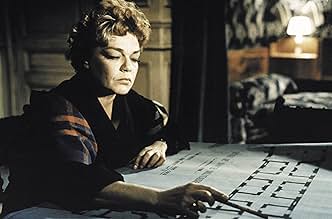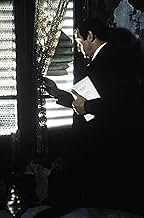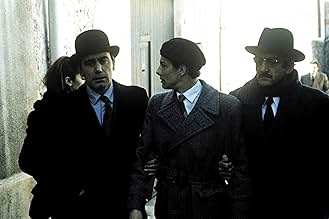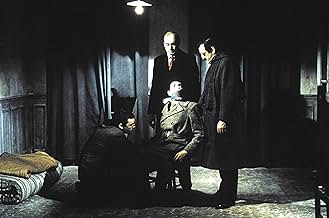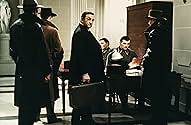L'armée des ombres
- 1969
- Tous publics
- 2h 25min
NOTE IMDb
8,1/10
28 k
MA NOTE
Un récit de combattants de la résistance dans la France occupée par les nazis.Un récit de combattants de la résistance dans la France occupée par les nazis.Un récit de combattants de la résistance dans la France occupée par les nazis.
- Réalisation
- Scénario
- Casting principal
- Récompenses
- 4 victoires et 1 nomination au total
Avis à la une
This is a film about real heroes. Not the flashy Rambo kind, but ordinary men and women who did extraordinary things in a time when France had already surrendered to the Germans. They only numbered a few hundred at most, and they walked in the shadows around France knowing that they would certainly die before it was over. Yet, they moved on and did what they had to without complaint or regret.
You won't see bombs blazing and blood and gore. What you will see is real people who agonize over every death that they are forced to carry out. People who knew that every corner held danger and that they could be betrayed at any time.
These are real heroes and this film portrays them as they were in a somber, intelligent, and dark fashion. The film was made and released in 1969, yet it's awards are in 2006 and 2007, when it was restored and finally presented in this country.
As the films of Jean-Pierre Melville are made available, we are able to share in seeing one of the truly great directors in the world. The pleasure is immeasurable.
You won't see bombs blazing and blood and gore. What you will see is real people who agonize over every death that they are forced to carry out. People who knew that every corner held danger and that they could be betrayed at any time.
These are real heroes and this film portrays them as they were in a somber, intelligent, and dark fashion. The film was made and released in 1969, yet it's awards are in 2006 and 2007, when it was restored and finally presented in this country.
As the films of Jean-Pierre Melville are made available, we are able to share in seeing one of the truly great directors in the world. The pleasure is immeasurable.
Never before (and after) a movie on French Resistance has been so "glamourless". Jean-Pierre Melville has been hailed as the father of the French gangster film. Certainly, his gangster films are probably the films for which he is best known (Le Doulos, Deuxieme Soufflé, Le Samourai, Le cercle rouge, Bob le flambeur) on par if not better than anything which Hollywood produced. Yet the world of the anonymous gun-toting hoodlum occupies only a part of his oeuvre.
'L'armee des ombres' (aka The Shadow Army) is Jean Pierre Melville 1969 masterpiece and does not deal with gangsters. The film is a mix of the director's war time experiences in the French Resistance and Joseph Kessel successful wartime novel. What is remarkable about this film is that Melville turned a mosaic of anecdotes that Kessel's novel is all about into a great, dark epic.
From the chilling opening shot of Germans marching down the Champs-Elysées to the final scene involving the fellow Resistant Mathilde (the great Simone Signoret) the film seems to demonstrate that fighting for an ideal often leads towards death and solitude. What Melville does successfully is to show those dead-ends the way they occur to their protagonist (very simply and minimalist), however more than showing them Mr. Melville managed to make these realities (death and solitude) an equally tragic experienced for the audience...
'L'armee des ombres' is Melville's most moving film, a monument to the spirit of the Resistance rather than its actuality. A poignant drama with a strong performance from not only Lino Ventura but also Simone Signoret, Paul Meurisse, Jean Pierre Cassel, Claude Mann, Paul Crauchet to name a few.
This is probably Melville's greatest cinematographic achievement and, when fiction becomes reality, when actors leave behind their egos to resurrect into heroes, when the colors of the film mirror the one of the soul and when silence becomes music, true cinema has been achieved 'L'armee des ombres' is a terrible yet powerful experience in which the words duty, courage, abnegation get charged with meaning
'L'armee des ombres' (aka The Shadow Army) is Jean Pierre Melville 1969 masterpiece and does not deal with gangsters. The film is a mix of the director's war time experiences in the French Resistance and Joseph Kessel successful wartime novel. What is remarkable about this film is that Melville turned a mosaic of anecdotes that Kessel's novel is all about into a great, dark epic.
From the chilling opening shot of Germans marching down the Champs-Elysées to the final scene involving the fellow Resistant Mathilde (the great Simone Signoret) the film seems to demonstrate that fighting for an ideal often leads towards death and solitude. What Melville does successfully is to show those dead-ends the way they occur to their protagonist (very simply and minimalist), however more than showing them Mr. Melville managed to make these realities (death and solitude) an equally tragic experienced for the audience...
'L'armee des ombres' is Melville's most moving film, a monument to the spirit of the Resistance rather than its actuality. A poignant drama with a strong performance from not only Lino Ventura but also Simone Signoret, Paul Meurisse, Jean Pierre Cassel, Claude Mann, Paul Crauchet to name a few.
This is probably Melville's greatest cinematographic achievement and, when fiction becomes reality, when actors leave behind their egos to resurrect into heroes, when the colors of the film mirror the one of the soul and when silence becomes music, true cinema has been achieved 'L'armee des ombres' is a terrible yet powerful experience in which the words duty, courage, abnegation get charged with meaning
Based on truth, the Army in the Shadows takes the French men and women of the Resistance as its theme, at a point near the end of the war when the Resistance movement and Nazi intelligence about its work and staff are both firmly established. As well as giving a thrilling history lesson in the workings of the Resistance, from the rural ladies who operated safe houses, to the chateaux-dwelling aristocrats whose lawns played host to light aircraft smuggling collaborators in and out of France, it also is a fascinating essay on the gruesome realities of heroism: including moments of hopelessness and complete failure of nerve. Events test our group of collaborators, so that each one bumps up against his or her personal limit, as to what they are intelligent enough to understand, brave enough to endure, and determined enough to achieve. Excellently acted and directed, it is a classic uncompromising Melville thriller.
This is a tough, somber film that captures the absurdities involved in war, and, ultimately, in life. The French Resistance "heroes" in the story are never shown conducting sabotage or planned attacks against the Germans, as one would get in a traditional World War II movie. Instead, we follow their claustrophobic and paranoid lives as they move from one hiding place to another (or one prison to another), constantly hounded by those in power, haunted by their own actions and the inability to communicate with those dear to them. Melville shows us their doubts and questions as they deal with betrayal, cowardice, and the murky ethics of killing their own to preserve the larger good.
Every episode in the film seems to lead to a darkly ironic conclusion, and the meaninglessness of their efforts becomes almost overwhelming, except that, somehow, these ordinary people continue to offer resistance in the face of death, so that their heroism lies not in the ability to stop the Germans but in taking action at all while facing the abyss.
While the acting is excellent all around, Lino Ventura's performance as Gerbier deserves special attention. It's hard to imagine any other actor bearing the tremendous weight of this film as well as he does. Gabin, at an earlier age, might have had the physical and emotional strength, but I'm not sure he would've been capable of Ventura's unassuming portrayal, which is so necessary for his character. The "shadows" at the core of this tale are seriously dark, and Ventura's Gerbier is strong enough to face them, yet modest enough to realize he can't conquer them on his own. The only way the Resistance makes sense by the end of this film, is in the collective effort of its members. Similarly, each of us, individually, cannot conquer death, but we as a group of human beings can continue to live on. _L'Armée des ombres_ ultimately moves beyond a story of the French Resistance in World War II and serves as a powerful existentialist epic, with Ventura's performance responsible for much of the film's dignity and humanity.
As with _Léon Morin, prêtre_ (1961), another story set during the war, Melville seems more emotionally present in _L'Armée des ombres_ than he does in his policiers or noir pieces, and after seeing the film, his overall body of work suddenly seems much heftier. While the movie isn't as visually daring of some of his other works, it has a dark beauty all its own, and his pacing, editing, shot selection, and use of sound show him in great artistic control. Forty-eight hours after seeing it, I still find myself caught in its world.
Every episode in the film seems to lead to a darkly ironic conclusion, and the meaninglessness of their efforts becomes almost overwhelming, except that, somehow, these ordinary people continue to offer resistance in the face of death, so that their heroism lies not in the ability to stop the Germans but in taking action at all while facing the abyss.
While the acting is excellent all around, Lino Ventura's performance as Gerbier deserves special attention. It's hard to imagine any other actor bearing the tremendous weight of this film as well as he does. Gabin, at an earlier age, might have had the physical and emotional strength, but I'm not sure he would've been capable of Ventura's unassuming portrayal, which is so necessary for his character. The "shadows" at the core of this tale are seriously dark, and Ventura's Gerbier is strong enough to face them, yet modest enough to realize he can't conquer them on his own. The only way the Resistance makes sense by the end of this film, is in the collective effort of its members. Similarly, each of us, individually, cannot conquer death, but we as a group of human beings can continue to live on. _L'Armée des ombres_ ultimately moves beyond a story of the French Resistance in World War II and serves as a powerful existentialist epic, with Ventura's performance responsible for much of the film's dignity and humanity.
As with _Léon Morin, prêtre_ (1961), another story set during the war, Melville seems more emotionally present in _L'Armée des ombres_ than he does in his policiers or noir pieces, and after seeing the film, his overall body of work suddenly seems much heftier. While the movie isn't as visually daring of some of his other works, it has a dark beauty all its own, and his pacing, editing, shot selection, and use of sound show him in great artistic control. Forty-eight hours after seeing it, I still find myself caught in its world.
This is probably one of the best fiction movies ever made on the French resistance during Worl War II. Far from the usual romantic cliches showing handsome young men playing tricks with the Nazis and falling in love with sublime women, the substance of the movie is reality. It depicts a "shadow army" made of courageous men who are ready to sacrifice their lives but are aware of the huge cost they will eventually have to pay. It shows the cruel and sometimes inhuman choices they have to make in order to survive. This is a very useful movie that gives a real hint of what resistance truly was.
Le saviez-vous
- AnecdotesCinematographer Pierre Lhomme claimed that the last surviving, watchable print of the movie had turned completely pink with age. He later supervised the 2k resolution, digital restoration of the film at the Eclair Laboratories in Paris.
- GaffesIn the London WWII sequence, double yellow lines are visible on the road. These were only introduced in the UK in 1956 and didn't become common until the 1960s; a few of the street signs have a style not known before the 1960s.
- Citations
Philippe Gerbier: See you, Comrade.
Legrain: You a communist?
Philippe Gerbier: No. But I do have comrades.
- ConnexionsFeatured in Mémoires pour Simone (1986)
Meilleurs choix
Connectez-vous pour évaluer et suivre la liste de favoris afin de recevoir des recommandations personnalisées
Détails
- Date de sortie
- Pays d’origine
- Langues
- Aussi connu sous le nom de
- El ejército de las sombras
- Lieux de tournage
- Bunker de l'armée, Saint-Cyr-l'Ecole, Yvelines, France(execution by the Gestapo)
- Sociétés de production
- Voir plus de crédits d'entreprise sur IMDbPro
Box-office
- Montant brut aux États-Unis et au Canada
- 861 983 $US
- Week-end de sortie aux États-Unis et au Canada
- 12 620 $US
- 30 avr. 2006
- Montant brut mondial
- 931 732 $US
Contribuer à cette page
Suggérer une modification ou ajouter du contenu manquant





